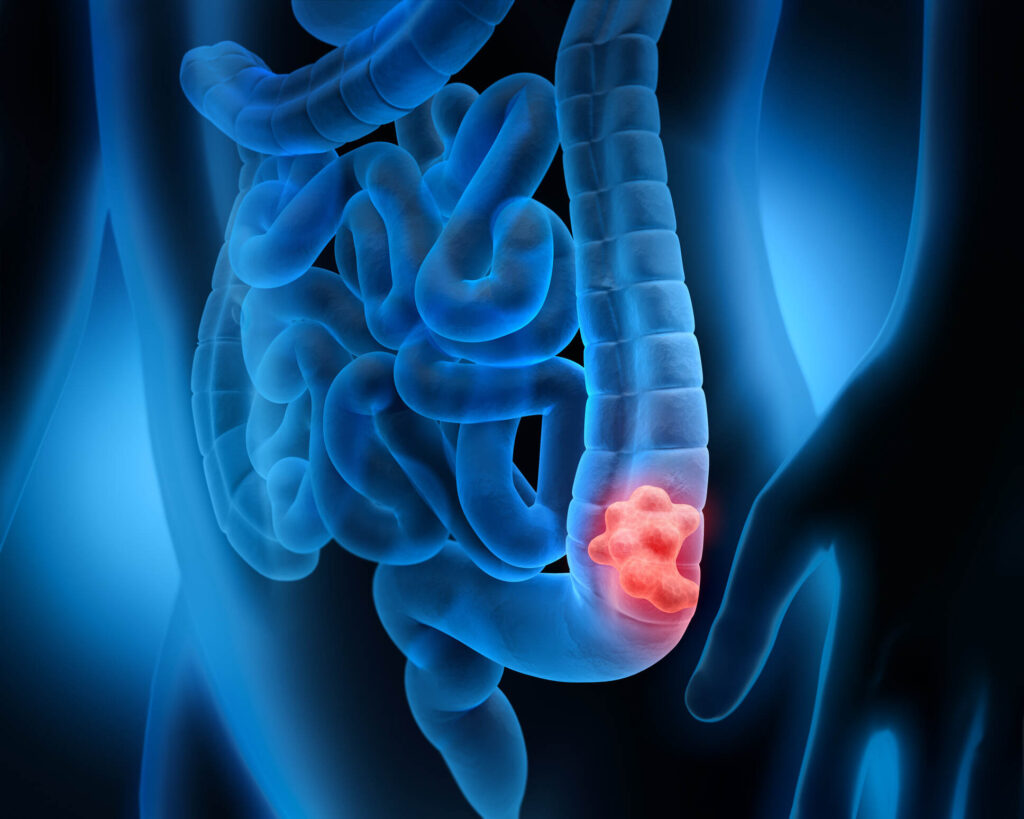
Overview
Colorectal cancer develops in the colon or rectum, parts of the large intestine. It is one of the most common cancers worldwide and is largely preventable with regular screening. Most cases begin as precancerous polyps that gradually become malignant.
Main types:
- Adenocarcinoma (most common)
- Rare types: carcinoid tumors, lymphomas, gastrointestinal stromal tumors (GISTs)
Symptoms
- Changes in bowel habits (diarrhea, constipation)
- Blood in stool (bright red or dark)
- Persistent abdominal pain, cramping, or bloating
- Unexplained weight loss or fatigue
- Feeling of incomplete bowel evacuation
Causes & Risk Factors
- Age >50
- Family history of colorectal cancer or polyps
- Inflammatory bowel disease (Crohn’s or ulcerative colitis)
- Diet high in red/processed meats
- Physical inactivity, obesity, smoking, alcohol
- Genetic syndromes (Lynch syndrome, FAP)
Diagnosis
- Colonoscopy with biopsy (gold standard)
- Fecal occult blood test (FOBT), FIT test
- CT colonography or sigmoidoscopy
- CEA blood test (tumor marker)
- CT/MRI for staging
Treatment Options
- Surgery (colon resection, low anterior resection)
- Chemotherapy (e.g., FOLFOX, CAPOX)
- Radiation therapy (especially for rectal cancer)
- Targeted therapy (e.g., anti-VEGF, anti-EGFR)
- Immunotherapy (for MSI-high or dMMR tumors)
Prognosis
- Highly curable when detected early
- 5-year survival rate:
- Localized: ~91%
- Regional: ~72%
- Distant: ~13%
Living with this Cancer Type
- Bowel function changes after surgery
- Support for colostomy care (if needed)
- Nutritional counseling
- Emotional support and survivorship care
Prevention & Screening
- Regular colonoscopy starting at age 45–50
- Polyp removal reduces cancer risk
- Healthy diet and exercise
- Avoid smoking and excessive alcohol
FAQs
Q: Can colon cancer be prevented?
A: Yes. Removal of polyps during colonoscopy prevents progression to cancer.
Q: What’s the difference between colon and rectal cancer?
A: Both are colorectal cancers but differ slightly in location and treatment approach.
Q: Is it hereditary?
A: Some cases are due to inherited syndromes. Genetic counseling is recommended for high-risk families.
Resources
- Colorectal Cancer Alliance
- American Society of Colon and Rectal Surgeons
- ClinicalTrials.gov
Understand Precision Testing
Learn how liquid biopsy and chemo sensitivity testing can personalize your treatment plan.
Make Informed Decisions
Gain knowledge to actively participate in treatment discussions with your healthcare team.
Improve Treatment Outcomes
Discover how precision medicine and metabolic therapies can enhance treatment effectiveness.
Start Your Educational Journey Today
Empower yourself with knowledge about precision metabolic oncology and take an active role in your cancer care journey.
Need More Information?
Our team of oncology experts is here to help you understand your diagnosis and treatment options.
